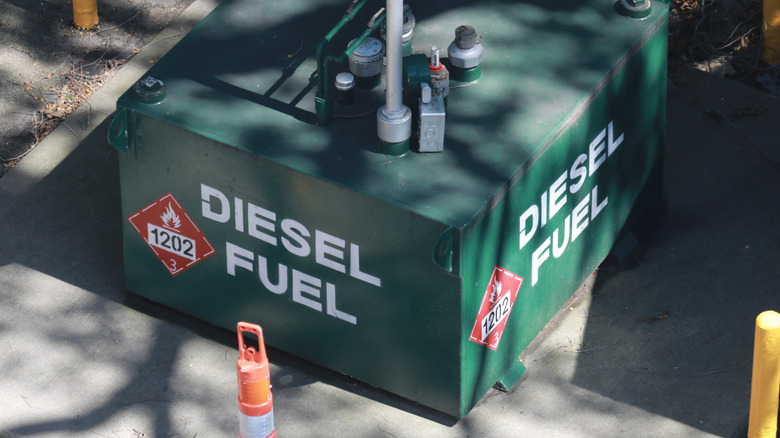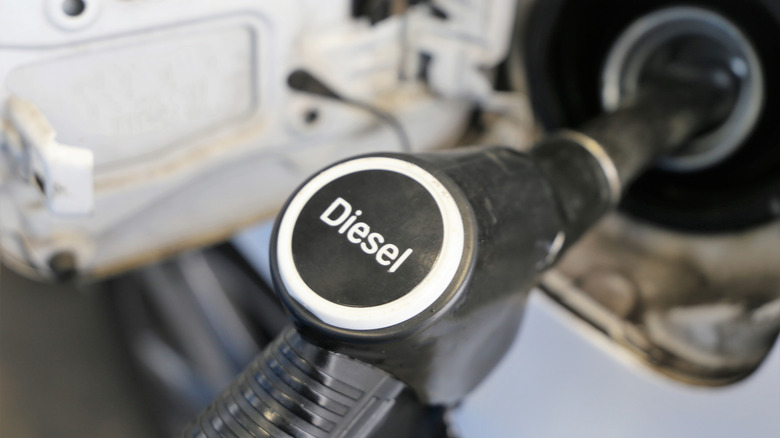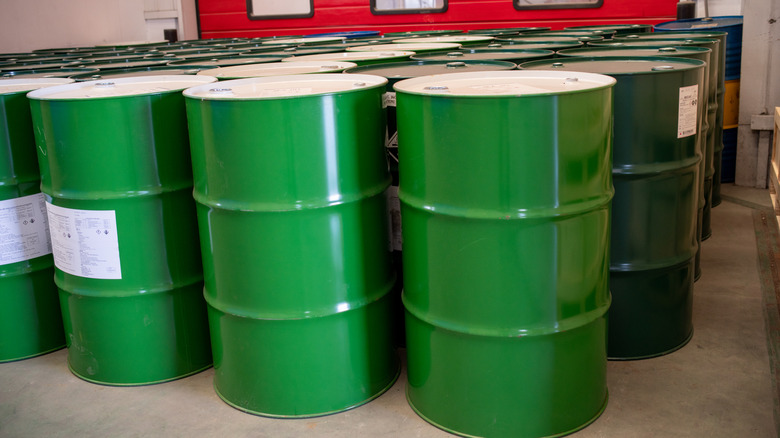Can Diesel Fuel Go Bad? Everything You Need To Know About Expired Fuel
According to Green Car Congress, more than 3/4 of the over 15 million commercial trucks on the road today in the United States use diesel fuel. Diesel fuel differs from gasoline in that it packs more energy per unit of volume, and diesel engines generally provide more torque and last longer than their gas-powered counterparts. There are some myths about diesel fuel that might scare you away from it, but there isn't any logic or science behind them. Diesel fuel is also used to power engines in generators, heavy equipment, boats, and planes.
One of the commonalities between gasoline and diesel fuel is that both will go bad after a long time in storage. Under ideal conditions diesel fuel can last as long as 12 months, but certain factors will cut that time down significantly. Diesel fuel can be contaminated by water, solid particles, microbes, or just oxygen. Storing it in an airtight and watertight container or tank at the right temperature can help, although it's challenging to do so easily and effectively.
How diesel fuel goes bad
All fuel degrades over time, but if you know what factors contribute to that degradation you might get that full year out of your stored diesel fuel. Oxidation occurs when the organic compounds in diesel fuel react with oxygen in the air. When this happens, the diesel starts to break down and form a sludgy mixture that doesn't burn as well as fresh fuel and can clog fuel injectors and filters.
There are other kinds of contamination that make diesel fuel go bad. Water is everywhere, and because it's more dense than diesel, it will sink to the bottom of your fuel tank or container. Running even small amounts of water through your engine can wreck it, and bacteria that grow in water will also form a gooey muck in stored fuel. Particles of dirt, dust, and rust from the inside of a tank or can also get mixed with diesel fuel, compromising its energy-producing abilities and potentially clogging fuel filters, pumps, or injectors.
Exposure to heat also breaks down diesel fuel over time. Ideally, diesel should be stored at room temperature of about 70º Fahrenheit. When exposed to high temperatures before use, diesel fuel can undergo unwanted changes to its chemical composition that reduce its ability to produce energy. Storing diesel in extreme cold can cause diesel fuel gelling, which is when petroleum wax particles used to help engine lubrication coagulate and thicken the fuel.
How to store diesel fuel
Most of these issues are only relevant if you're storing enough diesel to keep a fleet of vehicles on the road. If you're only keeping a few gallons in your truck or garage, you'll probably use it before it goes bad. Keep it in a closed can that's stored away from sources of heat, cold, and moisture, and you should be fine for up to a year.
If you've found that stored diesel fuel has gone bad, the safe option is to dispose of it responsibly and replace it; contact your local hazardous material disposal facility to find out how to get rid of it. Diesel fuel that has lost its viscosity (ability to flow easily) will gum up the inside of your engine, making it work harder and wear faster. By slowly pouring diesel into another approved container you should be able to see any sludge or gelling, but it's best to dispose of any fuel you think might have gone bad. Contact your local hazardous materials collection site to find out how to do so safely.
It's smart to try and fill your tank at stations that enjoy steady traffic, because less busy stations will have fuel sitting in their underground tanks longer. Using an additive like Hot Shot's diesel treatment or Lucas Oil Fuel treatment can help stabilize fuel and clean dirty injectors, but for serious contamination consider diesel fuel polishing, a multi-stage filtration process that extends the life of stored fuel. Polishing removes water and other contaminates from the fuel, allowing it to be used safely. Not all spoiled diesel can be polished, though, and always replacing your fuel filter at the recommended interval will make bad fuel less of a problem for your engine.


